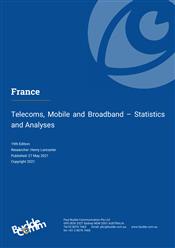France Telecoms Market Report
Telecoms, Mobile and Broadband - Statistics and Analyses

France’s MNOs extend 5G services following 3.5GHz auction
Supported by a population of more than 65 million, France’s telecom market is one of the largest in Europe. Telecom revenue, at about €30 billion annually, has declined in recent years and came under particular pressure during 2020 when a sequence of local and national lockdowns, as well as restrictions on international travel, resulted in a sharp drop in revenue from roaming and device sales. This was partly offset by growth in data traffic and the migration of subscribers to faster fixed-line broadband packages, mostly based on fibre.
The incumbent telco Orange Group is one of the world’s major players, with interests in markets across Europe, the Middle East and Africa. The company has embarked on a new multi-year Engage 2025 plan which is focussed on growth in the developing markets, and on the greater use of artificial intelligence and data. Despite market liberalisation, Orange still dominates all sectors, though increasing competition from a number of major players has gradually eroded this lead.
The mobile phone market, worth about €13 billion annually, is dominated by Orange, SFR Group (owned by Altice Group), Bouygues Telecom, and Free Mobile (Iliad). There are many MVNOs in the market, though their share of subscribers fell at the end of 2020 when one of the largest of them was acquired by its host network operator. LTE networks provide near universal coverage, and carry about 95% of mobile data traffic. Operators have launched 5G services, and these have been supported by the late-2020 auction of spectrum in the 3.5GHz range.
France’s fixed broadband market is increasingly focussed on fibre, which accounted for 71% of all fixed lines at the beginning of 2021. Growth in the fibre sector has been stimulated by households securing faster data packages during the pandemic. The number of DSL lines has fallen sharply as customers migrate to fibre infrastructure.
BuddeComm notes that the Covid-19 pandemic continues to have a significant impact on the telecoms market. On the consumer side, spending on telecoms services and devices is under pressure from the financial effect of large-scale job losses and the consequent restriction on disposable incomes. However, the crucial nature of telecom services, both for general communication as well as a tool for home-working, has offset such pressures. In many markets the net effect has been a reduced (and sometimes negative) subscriber growth, which will continue into 2021.
Overall progress towards 5G may be postponed or slowed down in some countries.
On the consumer side, spending on telecoms services and devices is under pressure from the financial effect of large-scale job losses and the consequent restriction on disposable incomes. However, the crucial nature of telecom services, both for general communication as well as a tool for home-working, will offset such pressures. In many markets the net effect should be a steady though reduced increased in subscriber growth.
Although it is challenging to predict and interpret the long-term impacts of the crisis as it develops, these have been acknowledged in the industry forecasts contained in this report.
The report also covers the responses of the telecom operators as well as government agencies and regulators as they react to the crisis to ensure that citizens can continue to make optimum use of telecom services. This can be reflected in subsidy schemes and the promotion of tele-health and tele-education, among other solutions.
Key developments:
- ARCEP assumes responsibility for press distribution, introduces measures to encourage the switch from copper to fibre infrastructure;
- SpaceX’s Starlink providing satellite broadband connectivity across France;
- Orange Group sets up Orange Concessions to coordinate fibre rollouts with local authorities;
- Iliad sells its French tower portfolio to help fund 5G rollout;
- Orange aiming to start closing down the PSTN from 2023;
- Regulator approves 5G trial licences in the 26GHz band;
- Report update includes the regulator's market data to March 2021, telcos' financial and operating data to Q1 2021, Telecom Maturity Index charts and analyses, recent market developments.
Companies mentioned in this report:
Orange, Iliad (Free, Free Mobile), Altice (SFR Group, Numéricable), Bouygues Telecom, Virgin Mobile, Omea Telecom
Related Reports
- Europe - Mobile Network Operators and MVNOs
- Luxembourg - Telecoms, Mobile and Broadband - Statistics and Analyses
- Montenegro - Telecoms, Mobile and Broadband - Statistics and Analyses
- Denmark - Telecoms, Mobile and Broadband - Statistics and Analyses
- Czech Republic - Telecoms, Mobile and Broadband - Statistics and Analyses
- Greece - Telecoms, Mobile and Broadband - Statistics and Analyses
- Cyprus - Telecoms, Mobile and Broadband - Statistics and Analyses
- Belarus - Telecoms, Mobile and Broadband - Statistics and Analyses
- Austria - Telecoms, Mobile and Broadband - Statistics and Analyses
Share this Report
TMT Intelligence
A platform to scale your intelligence tasks
Monitor critical insights with our AI-powered Market Intelligence Platform gathering and analyzing intelligence in real time. With AI trained to spot emerging trends and detect new strategic opportunities, our clients use TMT Intelligence to accelerate their growth.
If you want to know more about it, please see:
Research Methodology
BuddeComm's strategic business reports contain a combination of both primary and secondary research statistics, analyses written by our senior analysts supported by a network of experts, industry contacts and researchers from around the world as well as our own scenario forecasts.
For more details, please see:
More than 4,000 customers from 140 countries utilise BuddeComm Research
Are you interested in BuddeComm's Custom Research Service?
Hot Topics
News & Views
Have the latest telecommunications industry news delivered to your inbox by subscribing to BuddeComm's weekly newsletter.